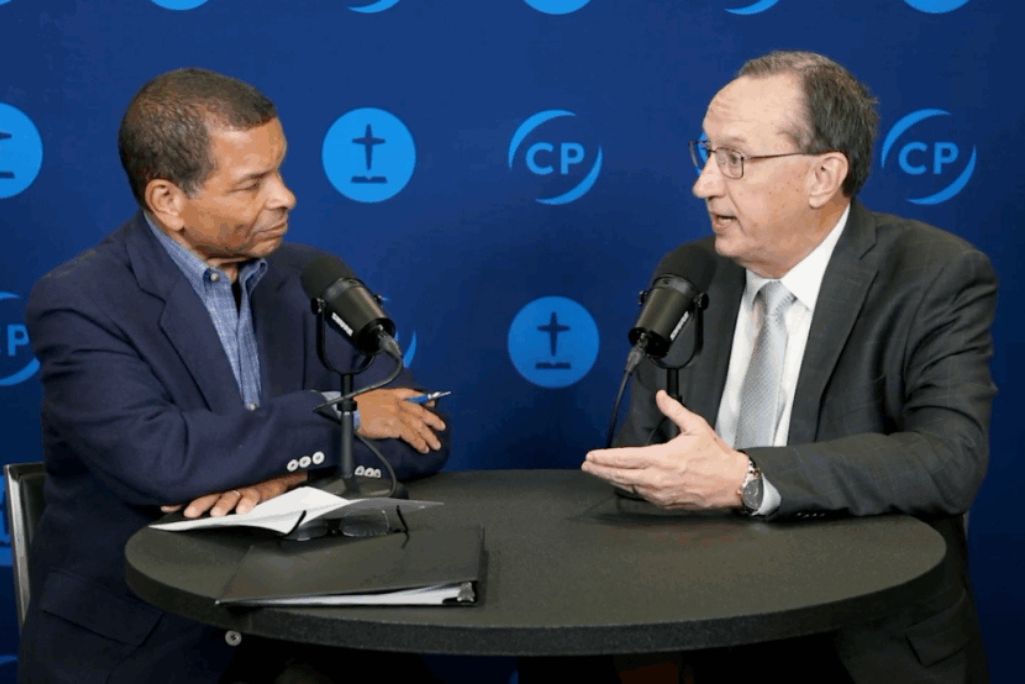
SBC Executive Committee President Jeff Iorg (right) was one of the guests interviewed by veteran Baptist journalist Lawrence Smith (left) in the "Better Together" podcast series recorded at the 2025 SBC annual meeting in Dallas. The 16 episodes, averaging 11 minutes each, focus on different aspects of Southern Baptist cooperation.
NASHVILLE (BP) — A newly available series of interviews with Southern Baptist leaders highlights the importance of active, intentional cooperation in areas such as student evangelism and mobilization, seminary education, missions and sexual abuse prevention.
Presented by Baptist Press’ weekly podcast “SBC This Week,” the 16 fast-paced interviews by veteran journalist Lawrence Smith focus on the Cooperative Program’s (CP) reach and average just over 11 minutes each. Conducted during the recent Southern Baptist Convention (SBC) annual meeting in Dallas, they are available at the Baptist Press YouTube channel.
Gateway Seminary President Adam Groza and his counterpart in New Orleans, Jamie Dew, discuss the connection between cooperative work and the Baptist Faith and Message in the first episode.
“When you boil it down… what is it that binds together this diverse group of churches and pastors and ministry leaders? It’s our shared commitment to the Word of God,” said Groza. “From a seminary perspective, that unites faculty. It unites the seminary with our constituents and draws students.”
The assurance of solid theological education allows ministers to rest easy, he added.
“If you’re a pastor looking to send somebody (to seminary), you’ve spent years discipling and cultivating them to trust God’s Word. The last thing you want is to send them somewhere that’s going to undermine the foundation you’ve laid.”
Brandon Porter, SBC Executive Committee (EC) vice president for convention communications, Baptist Press editor and the weekly cohost of “SBC This Week,” said the Cooperative Program was “vital” to the mission of Southern Baptists.
“We hope these podcasts will help them learn how their resources are being stewarded and, maybe, think of new ways churches can work together,” Porter said.
A conversation with Lifeway Research Director Scott McConnell addressed trends in Southern Baptist life, both good and bad.
SBC membership peaked in 2006, he explained, but began a “rapid” decline that continued into the COVID-19 pandemic. And while many churches closed and struggled to recover, there has been room for optimism.
“Shorter-term trends are really encouraging,” he told Smith. “The last couple of years, we’ve really seen a big rebound (and) activity coming back and some pretty aggressive levels.”
Prompted by Smith to focus on particular areas of positive development, McConnell cited a 6.2% increase in worship attendance and 5.7% rise in weekly Sunday school or Bible study participation.
“Those are vital parts of discipleship and a church coming together and cooperating,” he said, later adding the most exciting revelation to be baptisms jumping more than 10.5%.
Shane Pruitt, national NextGen director for the North American Mission Board (NAMB), and Paul Worcester, NAMB National Collegiate director, also noted a change since COVID-19 that has led today’s students to be among the most reachable in recent memory.
“One thing Paul and I say is that the pandemic didn’t really create new problems for a generation, it just poured gasoline on problems that were already there,” said Pruitt. “Now you have young people at the end of themselves at an early age. They realize the world is broken. They realize they’re broken. So they’re looking for hope.”
Worcester spoke to “sparks of revival” he has seen on many campuses, such as at Baylor University.
“There’s this bubbling up of prayer across the campus,” he said. “It started with a couple of key collegiate leaders uniting together to pray monthly, and then they got the students to pray together and it kind of created this trickle-down of prayer. It’s one of the most prayer-saturated campuses I know.”
As other interviewees said, the Cooperative Program remains a driving force for those results.
There are approximately 72 million high school and college students, as well as young people into their mid-20s, said Pruitt. No single church or college ministry reaches them alone.
“It’s a massive generation, so that means a massive mission field,” he said. “When the Cooperative Program encourages and brings churches together, to bring cooperative effort together, then we get to do incredible things like reach the lost with the gospel of Jesus Christ and mobilize the church to do that.”
Jeff Dalrymple, who directs the EC’s office for sexual abuse response, spoke of new and upgraded resources for Southern Baptists. One of the highlights in his new role was seeing the work of state conventions for sexual abuse prevention measures.
“We’re there to help educate and equip,” he said. That comes about through continuing to build relationships with state leaders such as Emily Smith, Arkansas Baptists’ abuse prevention and response consultant, who appeared on the podcast with Dalrymple.
“We have to come to the realization that we’re never going to be 100% risk-free,” she said. “But we can put measures in place (and) minimize that risk.”
Executive Committee President and CEO Jeff Iorg spoke of the CP as “a year-by-year sustaining force” that impacts numerous ministries.
Southern Baptist entities are the more visible examples, but what’s often overlooked is CP’s effects on supporting state convention ministries such as church planting, camps, conference centers, children’s homes, retirement centers and the like.
“None of these things are going out of business next year because they don’t have funding, and none are going to have to go out and raise money to survive,” Iorg said. “They’re counting on a steady flow of resources that comes voluntarily without coercion… to support this miraculous, wonderful work.”
California Baptist State Director Pete Ramirez spoke on that connection in a separate podcast.
“When we promote this ‘Better Together’ idea … it’s about the Great Commission work that God has called us to do,” he said. “It’s about the ‘win’ that the Lord gets as we work with a heart towards mission, with a heart to honoring God. When we do that, we can see great things happen within our family and our convention.”
(EDITOR’S NOTE — Scott Barkley is chief national correspondent for Baptist Press.)


